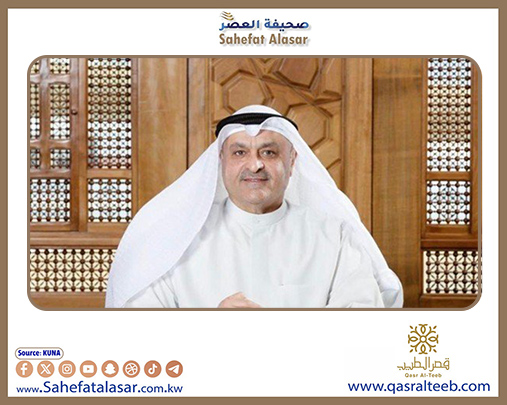


The Secretary-General of the Arab Energy Organization (AEO) - formerly OAPEC - Jamal Al-Loughani, emphasized the importance of diversifying the energy mix without excluding any energy source. He stressed that oil and gas will continue to dominate with a share of more than 50% of this mix, both presently and in the future.
This came in a statement made by Al-Loughani to the Kuwait News Agency (KUNA) on Sunday, on the occasion of the AEO General Secretariat issuing its quarterly follow-up report on developments in new and renewable energies, energy transition issues, and climate change for the second quarter of 2025.
He attributed this primarily to the increasing demand for oil and gas across all economic sectors, such as transportation and electricity, and their growing necessity in numerous industries like petrochemicals, fertilizers, heavy industries, and others.
He explained that with increased investment and innovation from member states in clean technologies, such as carbon capture, utilization, and storage (CCUS) technology, the petroleum industry will become more sustainable and reliable to meet the growing energy demand.
He noted that the renewable energy sector witnessed significant global expansion during the second quarter of 2025, driven by substantial investments and supportive policies. China maintained its global leadership, accounting for half of the global solar capacity and developing the largest floating wind turbine, while also commencing construction of the world's largest hydroelectric dam.
He reported that in the United States, clean energy provided most of the electricity for three consecutive months (March, April, and May) this year for the first time ever. Meanwhile, India saw a sharp rise in renewable capacity additions, supported by solar energy projects.
Al-Loughani pointed out that many Arab countries, for their part, continued their policies supporting renewable energies based on an economic diversification approach. He clarified that despite this positive momentum, the renewable energy sector faced several challenges, most notably political and regulatory instability in some markets.
He affirmed that enhancing the infrastructure for renewable energy projects is no longer an option but a necessity, as climate risks are increasing significantly alongside growing global interest in renewable energy sources.
He explained that Arab countries have the capability to produce green hydrogen at a globally competitive cost and can use it for decarbonization, either through direct use or by producing derivatives like ammonia. This can also attract foreign direct investment, provide quality job opportunities, improve the trade balance through import substitution, and create added value by exporting low-carbon products.
He stated that achieving success in energy transitions requires aligning ambitions with executive capabilities by adopting realistic steps, pumping in long-term investments, and establishing reliable regulatory frameworks. Effective energy transitions are no longer just an environmental issue but have become fundamental to economic stability.
Al-Loughani mentioned that despite global progress in energy transitions, a funding gap persists between needs and required investments. Since 2021, over 90% of total global investments in clean energy have gone to advanced economies and China, even though 80% of future energy demand growth will come from developing countries. This reflects a structural imbalance that must be addressed to ensure a fair and effective global energy transition.
He explained that nuclear energy represents a pivotal strategic option for enhancing global energy security and achieving emission reduction goals. Despite facing time, financial, and technical challenges, continuous developments in reactor design, particularly small modular reactors (SMRs), open new horizons for adopting more flexible, efficient, and suitable solutions for the needs of countries worldwide.
He stressed that critical mineral markets are a strategic element in the transition to clean energy, but challenges related to geopolitical constraints could pose crucial tests for the world's ability to meet the needs of the energy transition.
Al-Loughani clarified that boosting investments in exploration, new recycling technologies, along with global partnerships, will remain a cornerstone for ensuring the sustainability of these markets and avoiding bottlenecks that could hinder the transition to a low-carbon economy.
He affirmed that data centers have become an integral part of the vital infrastructure of the global digital economy, and their role will continue to grow with the expansion of artificial intelligence and accompanying digital services. However, sustaining this growth requires significant coordination between technology companies, global governments, and electricity suppliers to ensure the provision of clean and reliable energy sources, alongside developing innovative solutions to reduce consumption and improve operational efficiency.
He stated that climate change is no longer a long-term challenge but a reality requiring urgent global action for adaptation, mitigation, and the protection of ecosystems, economies, and societies alike. He indicated that "COP30 must be a turning point that is not limited to achieving ambitions but also includes justice, equity, and finance for those facing the risks of climate change."
He pointed out that artificial intelligence technologies offer significant potential for reducing greenhouse gas emissions. They can help reduce energy waste, improve its consumption and distribution, determine emission levels from industrial processes, enhance grid efficiency, forecast energy demand, and strengthen early warning systems to predict extreme weather events, enabling proactive disaster risk management.